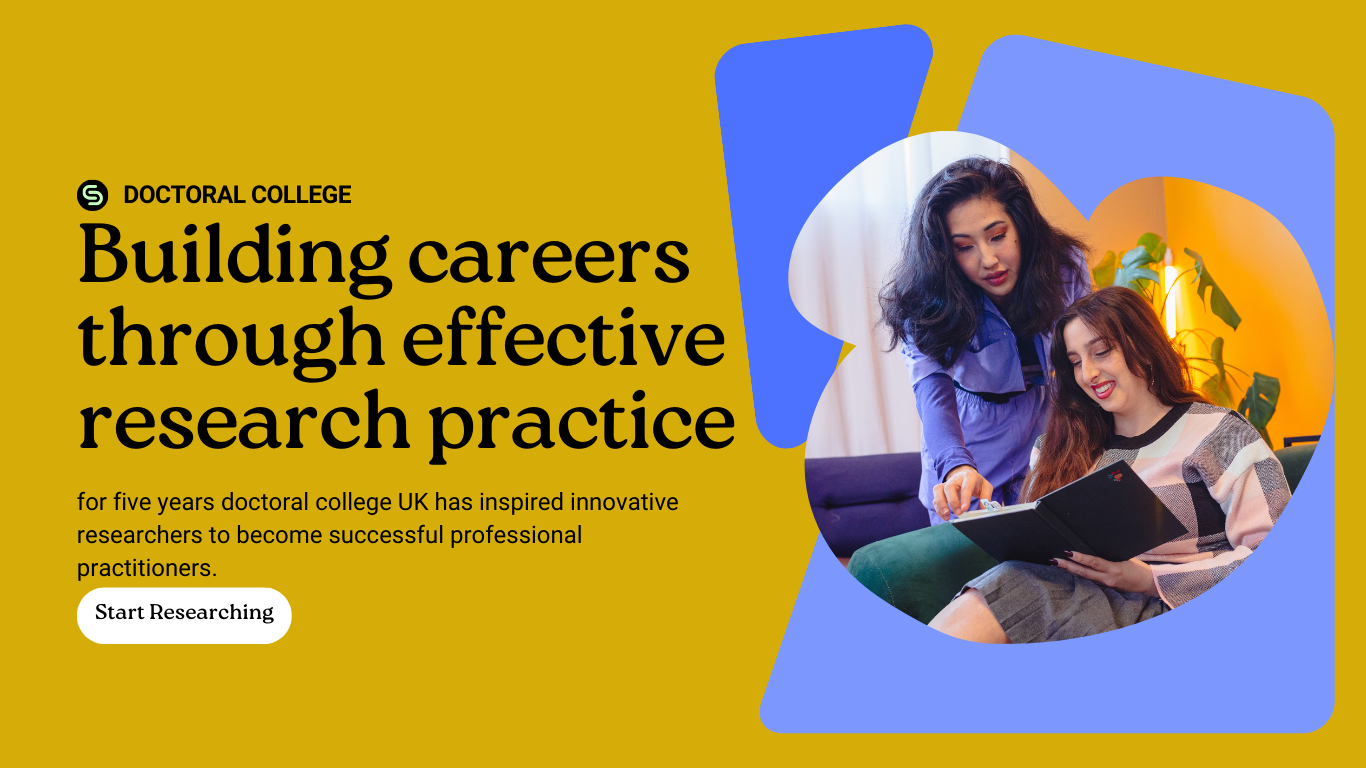Doctor of Philosophy (PhD) 3 years full time study
Doctor of Philosophy – PhD
A PhD (Doctor of Philosophy) is a doctoral research degree, a doctorate is the highest level of academic qualification you can achieve. A PhD degree normally takes between three and four years of full-time work to complete. You’ll research and write a thesis offering an original contribution to your subject.
Course Objectives
Objective 1 : Students will develop knowledge for understanding research and interpreting data in applied settings. Objective 2: Students will conduct methodologically sound research. Objective 3: Students will disseminate research in a public forum or in a publication outlet.
Curriculum
This PhD programme provides a route for students to carry out their own research project: an investigation that will eventually contribute to the field of knowledge within the subject area chosen and agreed with Doctoral College UK. Students will work closely with supervisor(s) to develop each stage of research. Supervisors will also help put together a programme of additional courses and activities to support progress towards the completion of the thesis.
Modes of Study
-
Fast Track – Full Time
-
Part Time – UK based students only.
Start Dates
-
January 2025
-
May 2025
-
September 2025
Reasons to study for a Doctorate
1. Feed Your Intellectual Curiosity
A Doctorate is an academic degree given to those who expand the boundaries of human knowledge in some specific subject area. Therefore, it is a form of social recognition. Maybe you have a curious mind and are interested in diving deep into a particular topic of interest. In that case, a Doctorate is an excellent opportunity to satisfy your intellectual curiosity while making at least one significant contribution to humanity. Researching for a Doctorate is particularly exciting because research moves faster than other areas of study. Every day, a new piece of Intellectual Property is being created, a new paradigm or methodology is proposed, and a new patent, copyright or design is released. The feeling of being at the forefront of such a revolution is extremely gratifying. Learning about advanced topics and performing research experiments demands a considerable amount of time. Thus, the Doctorate is one of the few opportunities in life in which one officially has the time to invest in such things. Research is a creative activity, and it’s fine if some experiment doesn’t give you the expected results. This is a position that can hardly be found when working in the industry, where the market pressure favours rapid development and well-established technologies. With a Doctorate, there are distinct levels of understanding. Knowing how to use a piece of theory is not the same as understanding how the theory is created. A Doctorate is a unique opportunity to dive deep into a particular subject, at the very minimum level of detail, to leave a footprint on it. If you possess this urge to learn and experiment, and at the same time, dream about making a difference in the world, then a Doctorate will give you a chance to pursue such sublime goals.
2. Become a Professional Researcher
The principal objective of a Doctorate is to train students to become professional researchers. Getting a position as a researcher is perceived to be a synonym of holding a very gratifying job. There are two types of professional researchers: academic professors and industrial researchers. The first group is tied to universities and has more freedom to pick their research topic, which explains why the research made in academia is often more theoretical. Industrial researchers often work at large companies and are more focused on producing practical results that could be translated into economic profit. Some people love the research freedom offered by academia and, at the same time, enjoy learning to become an effective and knowledgeable teacher. Note if you wish to teach at the highest level (i.e., at universities), you will need a Doctorate and probably a Post Graduate Teaching Certificate. In addition to pursuing academic teaching some professors, get involved with government research funded projects while other professors prefer to engage with enterprise activities and projects with businesses and industry. All three areas of work require the professor to continue their research and build their knowledge, skills and experience to maintain their professorial role.

3. Build a Career Network
As occurs with writers, there is a common belief that researchers are lonely people working in isolated environments. This is simply not true. A significant part of research work is about communicating your results. To do so, Doctorate students must learn how to get attention by appropriately targeting the right audience. This can only be done through effective networking with the most talented researchers in the field. Most people in your immediate circle, excluding supervisors and teachers, will be at the same level as you in the professional hierarchy. All of them are talented Doctorate staff or students sharing the same high-level goals and with a similar urge to learn and experiment. This means that you will be surrounded by an elite resource in an environment that explicitly promotes professional growth. Also, as everyone is working in a very tiny and specific area, it is practically impossible to be working on the same thing. As a result, colleagues and fellow researchers are not perceived as competitors but collaborators. Assisting at conferences is an excellent way to perform “intellectual tourism.” There, one can interact with the cream of young researchers eager to receive attention. Many of these people will become successful entrepreneurs or occupy prestigious positions at big blue-chip companies. Others will become prestigious professors, and a very few of them will make significant contributions in your field, write world-acclaimed books, etc.
4. Set yourself apart from the competition
The Doctorate journey will arm you with a set of technical and non-technical skills to satisfy this ambition. There are many good specialists out there, but a Doctorate teaches you how to methodically solve complex problems, write well, and communicate with others. Professional recruiters know very well that candidates with this combination of talents are not very common in the job market. If you succeed to graduate, you have been battle-tested. You have learned how to organise a research agenda and formulate specific research questions. A Doctorate prepares you well to ask questions with a high level of abstraction and give you the confidence to be able to approach projects from a more holistic perspective than others. These soft skills are difficult to learn and can only be acquired through experience. Leveraging this as a professional advantage may set you apart from the competition, providing the foundation to start a strong career anywhere. The technical skills allow you to become an expert in a very particular field. Being an expert positions yourself as someone more valuable, and many companies are willing to pay for this particular value. They will provide you with all you need to apply those skills and as new opportunities arise, which translates into your ability to pursue a high-level career within the industry.
5. Challenge Yourself
Some people are more ambitious than others (professionally speaking). If you are very ambitious, you need to be thinking about what is beyond taking a role in business or industry. You should feel the urge to prove yourself (and maybe to others) that you are capable of obtaining the highest academic title available. It does not matter how good you are, it would be difficult to convince someone that you are capable of producing unique knowledge without having published a single journal paper. Research work encourages personal growth by offering a perfect playing field for a professional competition. The whole system encourages this attitude by measuring the calibre of a researcher on the basis of its raw numbers. For example, the number of papers, citations stats, graduated students, grants awarded, and so on. If you can show that you are good in such a competitive environment, no one will deny that you belong to a selective group: the best of the best. Some other people feel social pressure and do not want to get behind other people in their close network. For example, if all your parents and brothers hold academic titles, you will probably feel the need to reach a similar status. Otherwise, you might be perceived as someone that belongs to an inferior category. However, the main driver for doing a Doctorate should be no other than satisfying personal aspirations.
6. Own your Work
As a paid employee working in a company, you probably have signed a contract explicitly stating that the results of your work belong to the company. In contrast, academic research is one of the very few positions where you can personally retain all the credits for your work. Taking ownership without facing the risks of being an entrepreneur is attractive. We are all social creatures motivated by pride and vanity. Academia is very aware of this and takes advantage of this phenomenon to retain talent by leveraging personal egos. Receiving ownership of the job is the incentive for many people that drives them to decide to stay in academy. The feeling of working for the university and for yourself is very appealing and difficult to ignore. A well-published paper is something that will remain forever, for anyone to see it. Your parents, your children, grandchildren, and so on. Just think about this for a moment. Every time you publish a paper, you will read your name there and feel a sense of ownership over this document. Academia gives researchers a fine sense of glory and reputation to live up to. A gift for the hard work made and normally the comparatively low pay received in exchange while being a doctoral student.
7. The world is one big opportunity
Everyone wants to live a good life. But the uncomfortable truth is that the majority of people in the world have the geographical fatality of being born in countries polluted by financial uncertainty and a lack of freedom. At some point in their life, people living in such places realize that it is difficult (if not impossible) to get a decent life there. Thus, the most viable solution for them is to travel, doing it as a student is often one of the simple ways to achieve this goal. Many doctoral students from the UK, US and Europe are talented internationals who decided to move (and where needed with their families) in search of a better future. The host country receives talented human resources to move forward in the global research field and the students get all the benefits of living in a highly developed country. After graduation, as a doctor in your chosen subject area, you will have acquired the knowledge, skills and experience to get a job of interest to you in these countries. It is a win-win scenario for everyone involved.




